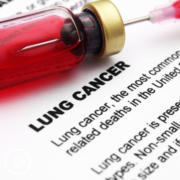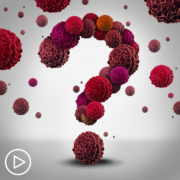Understanding Small Cell Lung Cancer Treatment Options
Understanding Small Cell Lung Cancer Treatment Options from Patient Empowerment Network on Vimeo.
How is small cell lung cancer (SCLC) treated? Dr. Triparna Sen discusses treatment options for patients with small cell lung cancer, both first-line and second-line therapies, and the important role of clinical trials in patient care.
Dr. Triparna Sen is an associate professor in the department of oncological sciences and co-director of the Lung Cancer PDX Platform at the Icahn School of Medicine at Mount Sinai in New York. Learn more about Dr. Sen.
See More from Thrive Small Cell Lung Cancer
Related Resources:

|

|

Advances in Small Cell Lung Cancer Research | Hope for the Future |
Transcript:
Katherine:
How do test results impact care?
Dr. Sen:
So, you know, once the doctor has confirmed the small cell lung cancer and we have confirmed what stage it is at – what I mean by staging is that it could be either a limited stage disease which is an early stage small cell, or it could be an extensive stage of small cell. The treatment for those two are quite different. So, if it is an early stage or limited stage, patients are usually treated with chemoradiation. If it is an extensive stage or a metastatic small cell, then patients are usually given a standard of care which is chemotherapy in culmination with immunotherapy which is an antibody against PD-L1.
Katherine:
You’re talking about treatment options that are currently available for small cell lung cancer. What about targeted therapies?
Dr. Sen:
There aren’t very many therapeutic strategies that are targeted therapies as we speak like we hear from non-small cell lung cancer.
So currently, like I mentioned, the frontline treatment for small cell lung cancer is with chemotherapy and immunotherapy and maintenance with immunotherapy alone.
Once the patient relapses, which often is the case – all patients actually have resistance to the frontline chemo-io (chemoimmunotherapy) at some point in time. Once they have a relapse disease, the second line of therapy until now is with either topotecan or irinotecan which are two topoisomerase inhibitors or with lurbinectedin which is in the second line.
So, when it comes to targeted therapies, so far we a have seen, you know, the conventional way that we think about EGFR inhibitors or KRAS inhibitors, it hasn’t been the case so far with small cell lung cancer. It’s very limited in the current approved setting. But there are many clinical trials that are investigating several targeted therapies that are either targeting – I can speak about that more as I talk about research strategy. But there are many targeted agents that are targeting surface targets like DLL3, B7-H3, or SEZ6. There are other targets that are targeting things like DNA damage repair, proteins, or epigenetic regulators like LSD1. But so far in the approved setting, it is quite limited.
Katherine:
When we look at what therapies are available, what treatment options are available, what are some typical side effects? How are they managed?
Dr. Sen:
Some of the major side effects that you see, especially with a frontline chemo-io (chemoimmunotherapy), are very common like you see with other cancer types. Also, it’s usually myelosuppression.
I think it is prevented or is managed either by dose reduction or treatment delays or treated with transfusion. There has been research that CDK4/6 inhibitors, trilaciclib, when treated with in combination with chemotherapy can bring down the side effects that we see with chemotherapy.
Some of the immunotherapy related adverse events includes pneumonitis, colitis. They are usually treated with early steroids, treatment withholding, and also it could be leading to permanent discontinuation of the treatment if the adverse events are really severe. Those are mainly what we see we the chemo-io (chemoimmunotherapy) regimen that is given up front.
Katherine:
Okay. What questions should someone be asking about their proposed treatment plan?
Dr. Sen:
Right. So, I think, of course, first is what stage. The treatment will depend upon the stage of small cell. Usually, on the frontline, everyone is given chemotherapy and immunotherapy.
It’s a systemic therapy that’s being given. But I think the patient should be asking questions like are there clinical trials available for me. Because there are multiple clinical trials right now in the frontline and the second line setting.
So, I think definitely the patient should ask about the clinical trials that the qualify for. In terms of contributing to research, I think if there are options for them to either sign up for blood collection protocol or for tissue collection protocol, I think the patient should definitely enroll for that.
Because that really helps our research strategy. But in terms of treatment, I think they should ask about available clinical trials that they qualify for.
Katherine:
Let’s turn to clinical trials then. Patient participation, of course, is essential to finding new and better treatments. What would you say to someone who’s hesitant to participate in a clinical trial?
Dr. Sen:
Yes. I mean, that’s often the thing. We hear about these novel drugs. They’re in trial. For a disease that’s that aggressive, I think once there is a relapse, I think clinical trials could be a very good option for patients. These are novel drugs that have come out of very robust research that we do in the lab. They can often work quite a bit. So, I think, of course, talk to your physicians. Talk to them at length about whether you do qualify for it. But if there is a trial at the center that you’re getting treated at and if the doctor advises that, I think enrolling in a clinical trial could be a very good option for patients, especially in the aggressive setting where there are not many options available for patients.
As I mentioned here, research is my true north. I mean, all my lab does is understanding the biology of small cell. It’s extremely essential that we actually try to get the knowledge of the patient tumor. So, if you have availability of contributing either in terms of tissue or blood to research, I think I would advise and encourage patients to definitely contribute to that.






